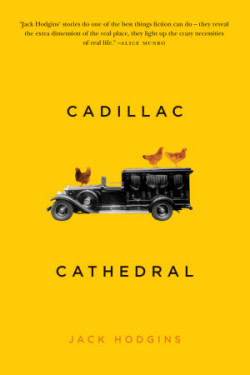Cadillac Cathedral
By Jack Hodgins
Ronsdale Press
213 pages; $18.95
Reviewed by Margaret Thompson
In his latest novel, Cadillac Cathedral, Jack Hodgins takes us back to familiar territory, the Macken world of mid-Vancouver Island. He recreates Portuguese Creek, a tiny community off the beaten track and populates it with what would have to be called characters in every sense of the word—retired loggers, a forceful ex-schoolteacher, eccentric chicken farmers. The focal point is Arvo Saarikoski, “a man in his seventies whose retirement years were filled with the pleasure of restoring cars and trucks that had been wrecked and then abandoned by those who could afford to replace them.”
Arvo hears of a vintage hearse, a Cadillac Cathedral, which is allegedly being used to haul logs out in the bush. It is a serendipitous moment, for Martin Glass, who used to be the local M.P., has died in Victoria. Arvo conceives of the idea of rescuing the hearse, collecting Martin’s body to bring it back home for a suitably dignified send-off, and then returning the hearse to its rightful owner, Myrtle, the daughter of a former local undertaker. Arvo is a lifelong bachelor, despite the determined efforts of the Woman from Thunder Bay and sundry other females, but he has enshrined Myrtle in his heart ever since their schooldays.
It is easy to visualize this novel as a road movie, a version for elders proceeding at the dignified pace of the vintage hearse, a leisurely journey that reflects the lives of the participants and the social mores of their world. Arvo and his retinue set off on their picaresque way to the south Island where Martin and Myrtle both wait, unaware. Naturally there are delays: Arvo reflects that some would consider “his whole life looked like a series of detours,” which they would call avoidance. Certainly, “a detour was also a reminder that there was no end of ways in which life could keep you from even reaching your destination,” and that is exactly the result here, with local businessmen hoping to acquire the hearse for publicity purposes, most notably with the vehicle being “borrowed” to star at a pre-mortem wake.
The slow pace gives Arvo plenty of time to reflect, and this inner debate is one of the most human elements of the story. Arvo has always been “a man who fixed things—machines anyway.” Decisions are another matter, especially when other people are involved. The advisability of renewing acquaintance with the unattainable Myrtle involves a mental roller coaster of indecision which life resolves in typically unsuspected ways.
And that, of course, is the real subject here. The final events at Martin’s seaside funeral seem to offer Arvo a different kind of future with Cynthia’s dreams of reviving her old drive-in movie business. As Arvo discovered with Myrtle, however, “something that belonged entirely in your past might as well disappear altogether once you were no longer part of it.” There is already evidence at the funeral that the demands of the future will override the nostalgic pull of the past: Martin’s absentee sons are already negotiating real estate deals at their father’s old home.
Hodgins calls his novel A Tale. A hint, perhaps, that we should enjoy this story for its narrative elements, for its light-hearted humour and gentle skewering of the human condition—for its sheer entertainment value—and also be prepared to recognize it as being more than the sum of its parts, almost allegorical. Cynthia, willing to embrace uncertainty, sums up the intent best: “Haven’t you noticed?” she says. “We start life over again every day. All of us. Even a man who hides in his workshop with grease up to his elbows.”
Margaret Thompson launches her new novel, The Cuckoo’s Child, at Russell Books, Tuesday, April 15, 2014, at 7 p.m.

{ 0 comments… add one now }